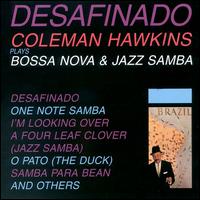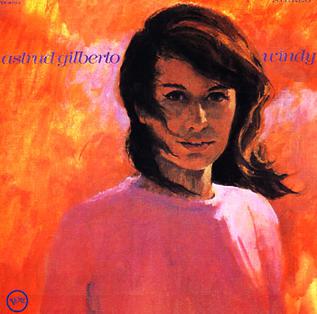
Antônio Carlos Brasileiro de Almeida Jobim, also known as Tom Jobim, was a Brazilian composer, pianist, guitarist, songwriter, arranger, and singer. Considered as one of the great exponents of Brazilian music, Jobim merged Samba with Cool jazz in the 1960s to create Bossa nova, with worldwide success. As a result, he is widely regarded as the "father of bossa nova".

Eumir Deodato de Almeida is a Brazilian pianist, composer, arranger and record producer, primarily in jazz but who has been known for his eclectic melding of genres, such as pop, rock, disco, rhythm and blues, classical, Latin and bossa nova.

Getz/Gilberto is an album by American saxophonist Stan Getz and Brazilian guitarist João Gilberto, featuring pianist and composer Antônio Carlos Jobim, who also composed many of the tracks. It was released in March 1964 by Verve Records. The album features the vocals of Astrud Gilberto on two tracks, "Garota de Ipanema" and "Corcovado". The artwork was done by artist Olga Albizu. Getz/Gilberto is a jazz and bossa nova album and includes tracks such as "Desafinado", "Corcovado", and "Garota de Ipanema". The last received a Grammy Award for Record of the Year and started Astrud Gilberto's career. "Doralice" and "Para Machucar Meu Coração" strengthened Gilberto's and Jobim's respect for the tradition of pre-bossa nova samba.

Luiz Floriano Bonfá was a Brazilian guitarist and composer. He was best known for the music he composed for the film Black Orpheus.

Jazz Samba is a bossa nova album by Stan Getz and Charlie Byrd released by Verve Records in 1962. Jazz Samba signaled the beginning of the bossa nova craze in America. Stan Getz was the featured soloist and the tracks were arranged by Charlie Byrd, who had first heard bossa nova during a tour of Brazil in 1961.
"Crickets Sing for Anamaria" is the English-language version of "Os Grilos", a song written by Brazilian musician Marcos Valle with his brother Paulo Sérgio Valle.
Ithamara Koorax is a Brazilian jazz and pop singer. For several years, she was voted one of the best jazz singers of the world by DownBeat Readers Polls. In 2008 and 2009, Koorax placed third on the "Female Vocalist" category on the 73rd DownBeat Readers Polls, with Diana Krall on the first place and Cassandra Wilson on second,, as well as on the 74th Annual Readers Poll.

The Sinatra–Jobim Sessions is a 1979 double LP compilation album of American singer Frank Sinatra's work with Antônio Carlos Jobim. The album was published only in Brazil by producer Roberto Quartin, and had never been re-released on vinyl or CD until 2010 when it was re-mastered and released under The Frank Sinatra Collection and became available worldwide.

1001 Albums You Must Hear Before You Die is a musical reference book first published in 2005 by Universe Publishing. Part of the 1001 Before You Die series, it compiles writings and information on albums chosen by a panel of music critics to be the most important, influential, and best in popular music between the 1950s and the 2010s. The book is edited by Robert Dimery, an English writer and editor who had previously worked for magazines such as Time Out and Vogue.

Desafinado is an album by American jazz saxophonist Coleman Hawkins featuring performances recorded in 1962 for the Impulse! label.

If I Were a Carpenter is an album by American singer Bobby Darin, released in 1966. It was a significant change in direction for Darin considering his previous album was a collection of show tunes.

Gilberto with Turrentine is an album by Brazilian samba and bossa nova singer Astrud Gilberto and American saxophonist Stanley Turrentine featuring performances recorded in 1971 released on the CTI label.

Windy is a 1968 studio album by Astrud Gilberto, arranged by Eumir Deodato, Don Sebesky, and Patrick Williams.
"The Gentle Rain" is a 1965 bossa nova composition by Luiz Bonfá, with lyrics by Matt Dubey. Originally written in A minor key and 4/4 time, this song was first released as part of the motion picture soundtrack of the 1966 film The Gentle Rain of the North-American director Burt Balaban. The music of the film was a collaboration of Luiz Bonfá as a composer and Eumir Deodato as orchestra arranger and director.

Samba '68 is a 1968 album by Marcos Valle, arranged by Eumir Deodato.
"Samba do Avião", also known as "Song of the Jet", is a Brazilian song composed in 1962 by Antônio Carlos Jobim, who also wrote the original Portuguese lyrics. The English-language lyrics are by Gene Lees.
"Ela é Carioca" is a bossa nova song composed in 1963 by Antônio Carlos Jobim, with Portuguese lyrics by Vinícius de Moraes. English lyrics were written by Ray Gilbert. The song is sometimes titled "Ele é Carioca ."
"Vivo Sonhando" is a bossa nova song from 1962 with words and music by Antônio Carlos Jobim. English lyrics were added later by Gene Lees.
"O Morro Não Tem Vez", also known as "Favela", "O Morro", and "Somewhere in the Hills", is a bossa nova jazz standard composed by Antônio Carlos Jobim with lyrics written by Vinicius de Moraes. The English lyrics were written by Ray Gilbert.












